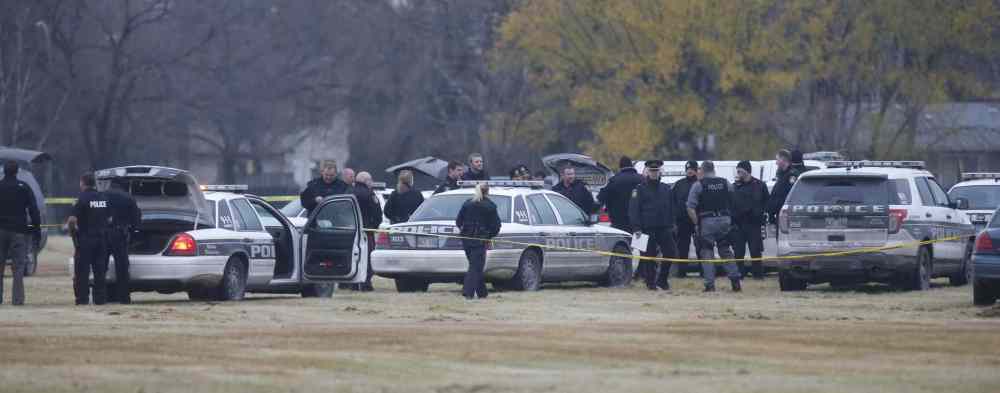Understanding the trauma experienced by police involved in deadly shootings
Advertisement
Read this article for free:
or
Already have an account? Log in here »
To continue reading, please subscribe:
Monthly Digital Subscription
$1 per week for 24 weeks*
- Enjoy unlimited reading on winnipegfreepress.com
- Read the E-Edition, our digital replica newspaper
- Access News Break, our award-winning app
- Play interactive puzzles
*Billed as $4.00 plus GST every four weeks. After 24 weeks, price increases to the regular rate of $19.95 plus GST every four weeks. Offer available to new and qualified returning subscribers only. Cancel any time.
Monthly Digital Subscription
$4.99/week*
- Enjoy unlimited reading on winnipegfreepress.com
- Read the E-Edition, our digital replica newspaper
- Access News Break, our award-winning app
- Play interactive puzzles
*Billed as $19.95 plus GST every four weeks. Cancel any time.
To continue reading, please subscribe:
Add Free Press access to your Brandon Sun subscription for only an additional
$1 for the first 4 weeks*
*Your next subscription payment will increase by $1.00 and you will be charged $16.99 plus GST for four weeks. After four weeks, your payment will increase to $23.99 plus GST every four weeks.
Read unlimited articles for free today:
or
Already have an account? Log in here »
Hey there, time traveller!
This article was published 07/11/2015 (3731 days ago), so information in it may no longer be current.
I remember my first feeling after hearing Friday afternoon about yet another police-involved shooting.
Thank God the officers are OK.
Then I had a flashback.

To a day in early September 1989, when a medicinally medicated Winnipeg police officer sat before the Aboriginal Justice Inquiry and described what it felt like to be part of a shooting where a man died.
“Seconds seemed like hours,” Robert Cross testified. “I wondered: ‘Did he get shot? Am I shot?’ “
Then, a man who had been diagnosed by psychiatrists with post-traumatic stress disorder, said this about the shot fired from his police revolver 18 months earlier: “It’s not like on TV… It’s an awful feeling.”
— — —
It was Friday’s Winnipeg police shooting — the second strangely similar one in two months — that brought back the memory of that quote and how the death of aboriginal leader J.J. Harper had haunted Cross. For the rest of his life, Cross would use alcohol to self-medicate. He would die little more than a decade after the shooting.
I thought of Cross — and police inspector Ken Dowson, who shot himself on the day he was supposed to testify at the inquiry — because of all the officers involved in the latest police shooting; those unnamed five who reportedly fired bullets Friday, and all the others who have been through those life-ending events they may have to deal with for a lifetime.
I wasn’t always so empathetic, much less understanding. Maybe if the psychiatrists had called what Cross was going through “shell shock,” I would have got it. Maybe not. But it had this relatively new name, PTSD, and back then I, like many others, were skeptical when Cross’s lawyer described the symptoms using terms such as poor concentration, impaired judgment and suicidal tendencies. Then there were the nightmares we learned about later. The flashbacks. Classic symptoms, all.
But, back then, some thought Cross didn’t want to testify. Especially after he did, and did it well. Loaded up with Valium.
Maybe I would have got it back then if I had talked to Gary Watkins, my boyhood hockey teammate, who volunteered for the U.S. navy, went to Vietnam and came home with PTSD.
Last September, not long after the first of the two most recent police-involved shootings — the one that began with a pursuit and ended in the death of a suicidal man — Watkins told me his war experience of surviving being shot down in a helicopter.
How, after being rescued from the wreckage and ensuing firefight, he was given a shot of whiskey. And ordered to write down everything that happened.
“You can see it in slow motion,” Watkins said. “One step at a time. Every fraction of a second. You know exactly what you did… what he did. I remember in vivid detail. Absolute vivid detail. Nothing missing.”
Later, the emotion kicks in, he said.
“And then your feelings become involved. Your feelings come later.”
But it’s not just the event you recall, he told me. It’s what happens right before.
“You get a call at a certain time. You’re driving down the road. You turn right.” In that way, for him, it’s like a movie.
A movie he has to watch, that never stopped playing, even 50 years later.
— — —
It’s been more than 25 years since Cross — and the PTSD he suffered with — enlightened both me, and more importantly, the police service.
The Winnipeg Police Department, as it was known back then, went through its own trauma after Dowson died by suicide and Harper died unnecessarily by police bullet. It forced the Winnipeg Police Service to change in many ways, including how it helped and treated and continued to support its officers after traumatic on-the-job events.
What hasn’t changed, though, is that feeling cops have when they shoot and kill someone.
“It’s not like on TV… It’s an awful feeling.”
An awful feeling that can keep playing like a movie if it isn’t treated early.
There are a lot more Winnipeg police officers with that awful feeling these days. Thank goodness they’re all OK, though. At least physically.
There’s a postscript to this column I need to share. Ironically, this week I chanced to meet a Winnipeg police homicide detective at a local breakfast place and mentioned PTSD.
He said the city is full of it.
People who aren’t police officers who have witnessed or been victims of violence. Their family members, too.
The walking emotionally wounded, who need help, treatment and our empathy, too.
gordon.sinclair@freepress.mb.ca


